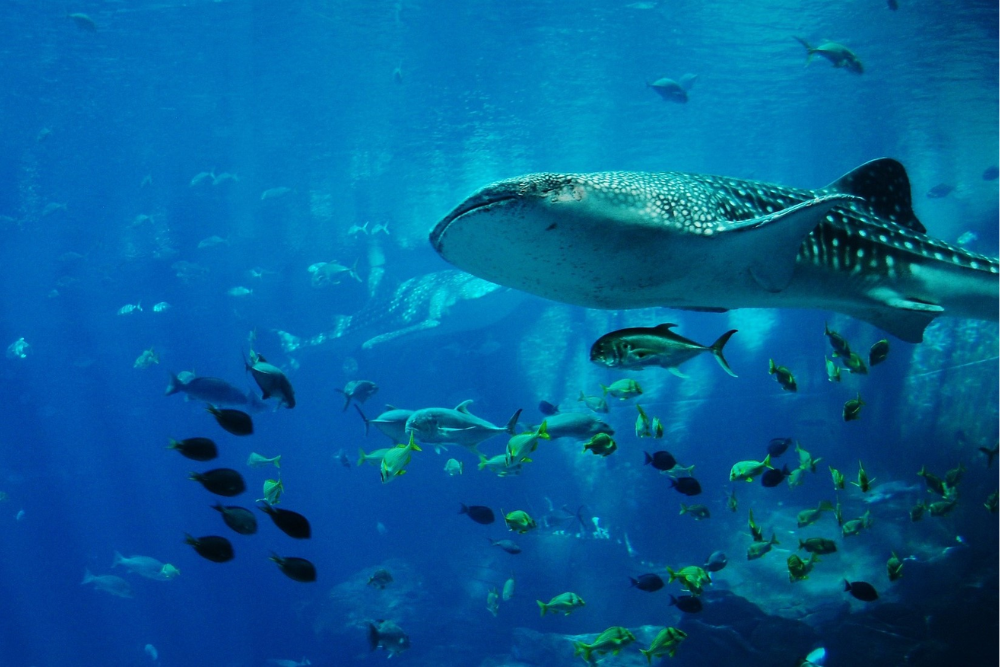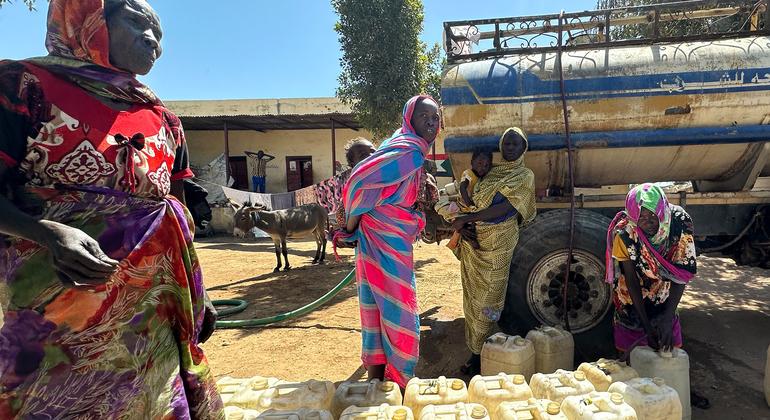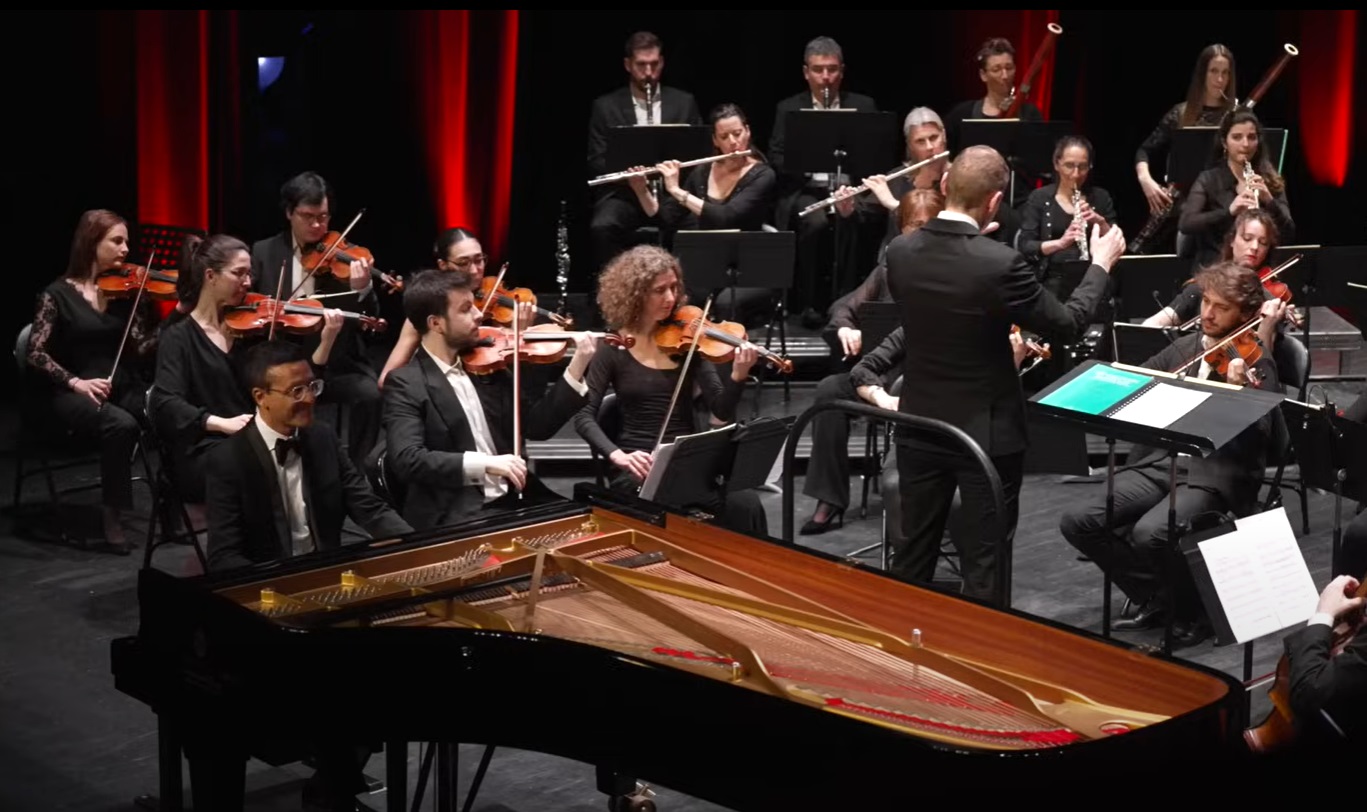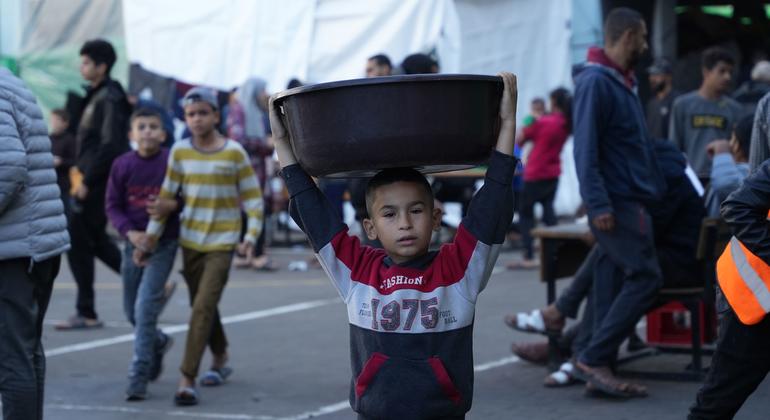Briefing the Council on the current situation on the ground, Ramesh Rajasingham, coordination director with UN humanitarian affairs office, OCHA, and Janti Soeripto of the non-governmental organisation (NGO) Save the Children, outlined the latest impact of the devastation that has followed the Hamas-led terror attack on Israel last October, which left more than 1,200 people dead and more than 240 taken hostage.
Mr. Rajasingham said more than 32,000 Palestinians have been killed, another 75,000 injured and 1.7 million people – two thirds of the enclave’s population – “forcibly displaced” to Rafah in the south.
Killing aid workers
Intense Israeli bombardment and fighting continues, with Israel still apparently intent on a military operation in Rafah to root out Hamas fighters.
At the same time, Israel’s siege has left Al-Shifa Hospital “almost entirely destroyed”, and the lack of protection for aid workers is tragically evident, he said, pointing to Israel’s deadly attack killing seven World Central Kitchen workers on Monday.
“Sadly, we cannot say that this tragic attack was an isolated incident in this conflict,” he said, extending condolences to those killed. “They join more than 220 of our humanitarian colleagues who have been killed, 179 of them UN personnel.”
This pattern of conduct calls into serious question the parties’ compliance with international humanitarian law, he said, emphasising that allegations of serious violations must be investigated and the suspects prosecuted.
‘No protection’
“The undeniable lack of protection for aid missions has forced World Central Kitchen and at least one other aid organisation – Anera – to suspend their operations,” he said, adding that both groups provide hundreds of thousands of people in Gaza with food each week. “It is unclear when their work will resume.”
In addition, “it is clear there is no protection of civilians in Gaza,” he added.
“If they have no protection from the dangers of armed conflict there, they must be allowed to seek it elsewhere, he said, emphasising that it is vital to recall that any persons displaced from Gaza must be guaranteed the right to voluntarily return, as international law demands.
World Central Kitchen supplies readied for shipment to Gaza. (file)
Hunger and Israel’s crackdown on UNRWA
In northern Gaza, one in six children in Gaza are severely malnourished, and more than 30 people have died of starvation, requiring immediate action, he said, adding that the primary obstacle is getting aid distributed. A “serious limiting factor” is that the UN agency for Palestinians, UNRWA, which is “the backbone of the humanitarian response”, has not been allowed to operate in the north of Gaza.
“If we are to stave off famine and address the unconscionably catastrophic humanitarian situation in Gaza, UNRWA – and indeed all impartial humanitarian organisations – must have safe, rapid, unimpeded access to all civilians in need. There is simply no replacement for the services UNRWA provides,” he stressed.
‘This tragedy cannot be allowed to continue’
The situation continues despite the provisional order of the International Court of Justice (ICJ) requiring Israel to take all necessary and effective measures to ensure, without delay, the unhindered provision at scale of urgently needed basic services and humanitarian assistance and the Security Council’s resolutions demanding a ceasefire and increased aid shipments.
“This tragedy cannot be allowed to continue,” he said. “All hostages must be immediately released and treated humanely until they are.”
Likewise, the people of Gaza need full compliance with international humanitarian law and with the ICJ’s orders, he said.
“They need compliance with the decisions of this Council, and they most of all need this devastating war to end.”
Thousands of young lives at risk of starvation: Save The Children
The President and Chief Executive Officer of Save The Children US, Janti Soeripto, paid tribute to the more than 200 humanitarians killed in Gaza, nearly all of whom were Palestinians. They include her colleague, Sameh Ewaida, who was killed in an Israeli airstrike on 12 December, alongside his wife and four children.
She told the Council that more children have been killed in the Gaza conflict than have been killed in all armed conflict globally over the past four years.
“In this conflict, 14,000 children have been needlessly and violently killed, thousands more are missing, presumed buried under the rubble. If I were to sit here and read the name and age of every Israeli and Palestinian child who has died on and since October 7, it would take me over 18 hours,” she said.
Man-made famine
In Gaza, almost 350,000 children under five are at risk of starvation, she said, warning that “the world is staring down the barrel of a man-made famine.” Hunger in the north is of particular concern.
“If the world continues down this path – of all parties to conflict flagrantly breaching the rule of war and international humanitarian law, of zero accountability, of powerful nations refusing to use the levers of influence at their disposal – then the next set of mass deaths of children in Gaza will not be from bullets and bombs, it will be from starvation and malnutrition,” she said.
Ms. Soeripti was speaking when New York City was rattled by a 4.8 magnitude earthquake, which was also felt in the Security Council Chamber. “You’re making the ground shake,” commented the Permanent Observer of the State of Palestine, Riyad Mansour, who sat beside her.
Continuing, she called for safe access and a ceasefire in Gaza so humanitarians can save lives, and for more aid and the resumption of commercial trade and markets. A plan to finance and rebuild critical infrastructure such as hospitals, schools, water systems and homes, is also needed.
Following the briefings, Council members roundly condemned the recent killings of World Central Kitchen aid workers and called for bigger, swifter aid deliveries. Many called for a ceasefire and for Security Council resolutions to be fully implemented, demanding an end to hostilities to get aid in and hostages out.
Algeria: ‘We must act now’
Algeria’s Ambassador Amar Benjama said Council members had gathered “once again as the aggression against the innocent Palestinian people reaches its six-month mark in two days; we must put an end to this aberration.”
The crime perpetrated against World Central Kitchen is neither surprising nor an exception, he said, adding that “it is just a new chapter in the book of crimes” committed so far.
He said Israel’s reaction had been “shameful” and a continuation of its doctrine of occupation and oppression.
“Humanitarian workers cannot be asked to serve at the peril of their lives,” he said.
“The international community and the Security Council cannot remain inert as life drains from Gaza. In the name of humanity, we must act now,” he added.
Russia: Ceasefire only way to prevent ‘apocalypse’
Russian Ambassador Vassily Nebenzia noted the UN expert on the Occupied Palestinian Territory had found evidence that genocide is being committed.
A genuine ceasefire is needed to prevent “an apocalypse in Gaza”, he said, adding that Israel is flagrantly disregarding Security Council resolutions.
As such, the Council should take action that could include sanctions.
Regarding the ongoing aid crisis, he said symbolic measures, like building a pier to receive goods, are just “humanitarian public relations”, adding that Israel is “hyping up” its allegations against UNRWA without providing evidence.
Israel’s “information war” has led to the United States and others ending funding to the UN agency, and Israeli authorities have denied UNRWA access to northern Gaza, where needs are great.
Asking whether Israel’s killing of aid workers including UN staff – and its other “atrocities” – will be investigated, he said the Council was duty-bound to address the situation.
Food convoys travelling into northern Gaza have been hit by shelling.
China urges support for Palestine’s UN membership
China’s Ambassador said Council resolution 2728 called for a ceasefire, but every day hundreds of civilians are dying as are aid workers and urged Israel to implement it immediately.
“The humanitarian disaster is beyond imagination,” he said.
Noting that all Council resolutions are binding, the ambassador said members could take further action to ensure the resolution 2728 is fully implemented.
Attacks on humanitarian workers are “shocking”, he said, and ending the violence is essential, as is working towards the two-State solution to the conflict.
“The key is we need to support Palestine’s full membership at the UN,” he said.
France says Israel must stick to its commitments
Nicholas de Rivière, the Ambassador of France, condemned the Israeli strike which caused the death of the seven World Central Kitchen staff and called on the Israeli authorities to conduct a thorough investigation and not let those responsible go unpunished.
Israel has made this commitment and will have to stick to it, he said.
Taking note of the measures announced on Friday by the Israeli government to increase humanitarian aid, he called on Israel to implement these announcements without delay.
“We call for the full implementation of Security Council resolution 2728 and an immediate and lasting ceasefire. France reaffirms its firm opposition to a ground offensive in Rafah which would result in a humanitarian catastrophe of a new magnitude. Achieving a ceasefire is a top priority for France.
United States: ‘Humanitarian personnel must be protected’
US representative John Kelley said despite the Security Council and General Assembly underlining the imperative to protect humanitarian workers, parties in Gaza are tragically not heeding those calls, including the attack on World Central Kitchen workers.
Representative John Kelley of the United States addresses the UN Security Council.
“An incident like this should have never happened and should never happen again,” he said, adding that this was not a stand-alone incident, with more than 220 aid workers being killed and more injured during the conflict. “Humanitarian personnel must be protected.”
Israel must announce and implement a series of steps to address civilian harm, humanitarian suffering and the safety of aid workers, he said, stating that “US policy with respect to Gaza will be determined by Israel’s immediate action on these steps.”
Given the allegations of UNRWA ties to Hamas, Washington supports ongoing investigations and noted the agency’s lifesaving work in Gaza amid a looming famine, he said, adding that “onerous restrictions on UNRWA’s work are unacceptable.”
Meanwhile, the US continues to make every effort to deliver aid to Gaza’s population, the entirety of which is in need of humanitarian assistance. But, this is not enough, and more aid must enter the enclave.
Washington has urged Israel to conclude a deal without delay to bring the hostages home and for Hamas to accept the deal “on the table”, he said.
Palestine: ‘Our failure means their deaths’
Ambassador Mansour, Permanent Observer for the observer State of Palestine, said Israel has destroyed homes, killed entire families, displaced the entire population, demolished hospitals and “made every effort to ensure no help could reach our people”.
“It is killing those who heal, those who rescue, those who provide aid and relief, those who feed, those who report,” he said. “Being a Palestinian is enough to be killed. Trying to help Palestinians is enough to be killed.”
The killing of World Central Kitchen aid workers is not an isolated incident, but “confirmation of what you all knew, for months now: Israel is targeting those that the laws of war were established to protect”, he said, adding that it is unfortunate it took the killing of foreigners for some to fully acknowledge the fate reserved to Palestinians for 180 days now.
‘You all knew what was coming six months ago’
At the same time, he said, Israel has ignored the Council’s demand for an immediate ceasefire and the ICJ’s order to prevent genocide.
Riyad Mansour, Permanent Observer of the State of Palestine to the United Nations, addresses the UN Security Council.
“The problem is that Israel can violate these rules, demands and orders in full impunity,” he warned.
“We knew, you all knew, what was coming six months ago,” he said. “We knew and you knew Israel would resort to mass and indiscriminate killing, to total destruction and devastation, that famine was on the way.”
He told ambassadors that “this genocide” was announced by Israeli leaders, perpetrated in broad daylight, “displayed on your screens” and “discussed in your meetings.
“Many of you were mobilised to stop it, but there are still tools that were not used, not even considered,” he said, adding that one day, as for other genocides, a lot will be said about these failures, but action is needed now and calling on Council members to figure out a way to stop the massacre and premeditated killing of children, women and men.
“I call on you to bring immediate relief to desperate parents who have withstood what no parent should endure and children who have suffered what no children should suffer for 260,000 minutes now,” he said. “Our failures mean their death. That should be reason enough for us to do everything in our power to bring this tragedy to an end.”
A residential block in the Al-Shaboura neighbourhood in the city of Rafah, lies in ruins.
Israel expresses sorrow for World Central Kitchen incident
Israel’s Ambassador Gilad Erdan expressed his delegation’s sorrow over the tragic incident that claimed the lives, of World Central Kitchen staff.
This was a tragic mistake for Israel never targets civilians, let alone humanitarian workers, he said, adding that the incident has been investigated by an independent body and two military officers have been dismissed.
He explained that the military standard operating procedures were violated due to Hamas’s cynical habit of exploiting civilians and that Israel is amid a defensive operation against an enemy who uses civilians as human shields.
“We did not start this war; we were attacked,” he said. “Due to the complexity of the battlefield, tragedy that took the life of our own people has occurred. The reality is that the loss of innocent lives during a war is sometimes unavoidable.”
Ambassador Gilad Erdan of Israel addresses the UN Security Council.
‘The war can end today’
The world must not forget why this war began, he continued.
“We are the ones who were butchered, and we are fighting to not be butchered again,” he said, emphasising that if Hamas frees all hostages, “the war can end today.”
The Security Council had demanded a ceasefire with “no strings attached”, he said, but there can be no solution as long as Gaza continues to be ruled by Hamas, which is responsible for the casualties and the humanitarian situation.
For its part, Israel imposes no limit on the amount of aid entering Gaza, but hundreds of trucks are held up waiting “because the UN failed to establish an efficient distribution mechanism”, he said, adding that on Thursday Israel decided to “ramp up” the amount of aid crossing into the enclave.
“You focus on Israel while ignoring the terrorists who have initiated this war,” he told Council members. “What does the Security Council have to say about Hamas, the looting of humanitarian aid, the rape of Israeli women or the daily firing of rockets? This discussion is detached from reality even though the truth is so clear. The time has come to stop defending terrorists.”















